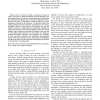Free Online Productivity Tools
i2Speak
i2Symbol
i2OCR
iTex2Img
iWeb2Print
iWeb2Shot
i2Type
iPdf2Split
iPdf2Merge
i2Bopomofo
i2Arabic
i2Style
i2Image
i2PDF
iLatex2Rtf
Sci2ools
113
click to vote
ICPP
2006
IEEE
2006
IEEE
Social Welfare Based Routing in Ad hoc Networks
— Due to resource scarcity, a paramount concern in ad hoc networks is to utilize the limited resources efficiently. The self-organized nature of ad hoc networks makes the social welfare based approach an efficient way to allocate the limited resources. However, the effect of instability of mobile nodes has not been adequately addressed in the literature. To efficiently address the routing problem in ad hoc networks, we introduce a new metric, maximum expected social welfare, and integrate the cost and stability of nodes in a unified model to evaluate the optimality of routes. The expected social welfare is defined in terms of expected benefit (of the routing source) minus the expected costs incurred by forwarding nodes. Based on our new metric, we design an optimal and efficient algorithm, and implement the algorithm in both centralized (optimal) and distributed (near-optimal) manners. We also extend our work to incorporate retransmission and study the effect of local and glob...
Ad Hoc Networks | Distributed And Parallel Computing | ICPP 2006 | Limited Resources | Social Welfare |
Related Content
| Added | 11 Jun 2010 |
| Updated | 11 Jun 2010 |
| Type | Conference |
| Year | 2006 |
| Where | ICPP |
| Authors | Mingming Lu, Jie Wu |
Comments (0)

